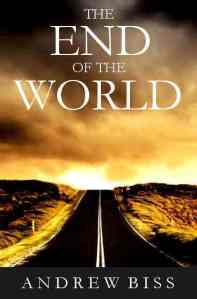Category Archives: The End of the World
The End of the World by Andrew Biss (2011)
Posted by Caroline Cryonic
 Smashwords / Amazon / Author’s Site
Smashwords / Amazon / Author’s Site
2/5 stars
Description:
Are you prepared for what comes next?
Accustomed to a life of cosseted seclusion at home with his parents, Valentine is suddenly faced with making his own way in the world. His new life is quickly upended, however, when he’s mugged at gunpoint. Finding shelter at a mysterious inn run by the dour Mrs. Anna, he soon encounters a Bosnian woman with a hole where her stomach used to be, an American entrepreneur with a scheme to implant televisions into people’s foreheads, and a Catholic priest who attempts to lure him down inside a kitchen sink. Then things start getting strange…
In this story based loosely around the state of Bardo from The Tibetan Book of the Dead – an intermediate state where the dead arrive prior to rebirth – dying is the easy part. Getting out of Bardo and returning to the land of the living is a far more perilous proposition, and unless you know what you’re doing…you might never leave.
An odd, yet oddly touching tale of life, death, and the space in-between.
Review:
The End of the World is a contemporary fantasy novella with an offbeat sense of humour. Valentine is a sheltered teenager who is thrown out of the house by his parents, and subsequently finds himself in a bizarre inn named The End of the World. When I say bizarre, I really do mean bizarre. Priests emerge out of kitchen sinks, the next door guest is walking around with a giant gunshot hole in what used to be her stomach, and Valentine tries to make sense of it all.
I enjoyed parts of this book. There’s some hilariously awkward dialogue between Valentine and his parents, and the narrative is sprinkled with colourful off-hand comments that require a double take. The humour tends toward the weird, dark, or perverted, which is all fine by me because it was done consistently. There’s a number of well-written descriptions, and I liked the story’s core message.
The book doesn’t reach its potential due to too much telling and not enough showing. The end notes state that this is a novella adapted from a play, which explains the heavy emphasis on dialogue and the noticeable lack of atmosphere, setting, or character interactions beyond sitting around and talking.
The story’s overall trajectory is predictable. The main conflict of the story is about Valentine trying to figure out what the inn is and how to move on, but the book description already spoils that this inn is based off purgatory, and it’s not much of a stretch to figure out what happened to him. Valentine also doesn’t get into much adventuring or much else before the story ends, so it feels like the entire second act is missing.
The characters are theatrical but unconvincing–more like types rather than real people. Valentine gets into an argument with a Catholic priest about religion, and I thought that the dialogue was so utterly silly that I couldn’t read it without cringing. I didn’t find the argument funny or intellectually stimulating, and that was the case with most of the dialogue in this book.
The problem with the other guests is that they are only characterized by where they came from and how they died. Beheaded Afghan man. Bosnian woman with no stomach. There wasn’t enough humanity or authentic slices of life to make them convincing. It’s like they were pulled out of the evening news report of who-died-in-the-world-today. Characters don’t have to be realistic or sympathetic to serve their role in a story, but they were caricatures without being funny or really doing anything. They were talking props for Valentine, and that was it.
I like the story’s central message regarding life and death, but it hits you over the head with it over and over again in dialogue which makes it lose its impact. In the end, I’m looking for a story to engage me in one of two ways: make me feel, or make me think. The best stories do both. Unfortunately, The End of the World does neither.
I think Biss has storytelling skill, but this adaptation needs to read more like a book. It’s not dealing with the limitations of a play, so there should be more action, scenes, and characters to beef up the second act. The message should be delivered through the progression of events rather than as infodumps through dialogue. A book is not limited by budget, sets, or actors–the only limit is imagination. Perhaps I would have enjoyed the play, but as a novella, I’d give it a miss.
You might like this if you like…
Dialogue dialogue dialogue; quirky and ribald humour; agnostics and atheists; setting… what’s that?
The End of the World is currently a free download at Smashwords and Amazon.
